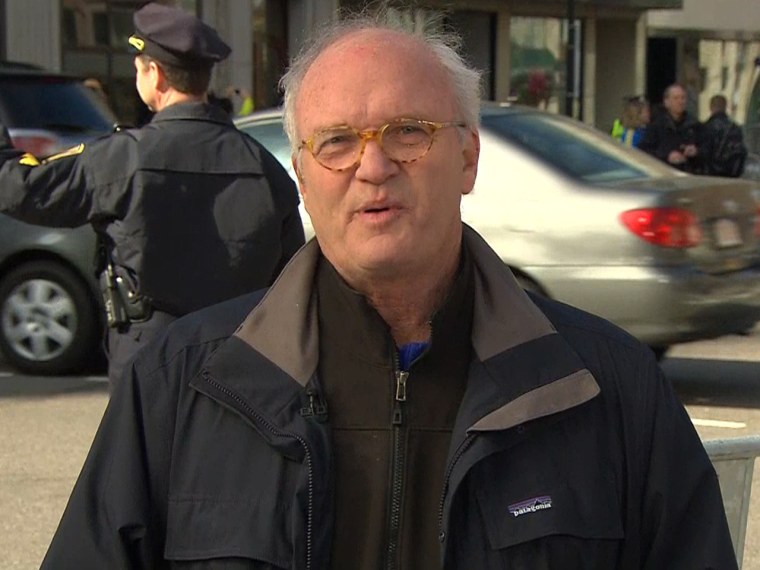To veteran Boston columnist Mike Barnicle, the bombs detonated at the Boston Marathon on Monday were more than a general act of violence: They were a personal attack on his city.
“This was as if someone came into your living room and attacked you in your home,’’ Barnicle told Willie Geist on TODAY Tuesday. “That’s the feeling, that’s the sense of the crowd. This was an attack on family.”
Barnicle, who wrote columns for The Boston Globe from 1973 through 1998 and is now a frequent contributor for MSNBC, noted the "somber pulse'' of the city the day after the bombings claimed the lives of three people and wounded 144 others. One of those killed was 8-year-old Martin Richard of Dorcester, Mass., who was at the finish line watching the race with his parents and 6-year-old sister.
Story: Witness who ran toward marathon bomb 'saw bodies flying'
“The death of any child shatters us all,’’ Barnicle said. “The sadness that comes with the death of an 8-year-old, you can magnify it by also thinking about the sadness that comes with all of the other 8-year-old, 9-year-old, 10-year-old children who now have a freeze frame in their minds, who were there yesterday, of the sights and sounds of the explosions that took place around them, of the bloodletting that went on. But they also have, and will have, a memory of strangers rushing to help strangers.’’
Boston is still reeling from the bombings, but is showing resilience in the aftermath.
“It’s a somber pulse today, but there is a pulse, and it’s vibrating throughout the city and hopefully throughout the country,’’ Barnicle said. “It’s the pulse of people who were knocked to their knees yesterday by these explosions that occurred on Boylston Street. The spirit is getting stronger here.’’
While the incident produced many horrific images, it also brought strangers running toward danger to help others.
“This is the memory they will have of people helping people, of people coming together in time of incredible trouble and violence,’’ Barnicle said. “That’s the spirit of this city. That’s the spirit of this country. We will go on.’’
For another columnist, sportswriter Mike Lupica of the New York Daily News, the frightening scenes in Boston brought back memories of 9/11.
“The sight yesterday of people running away from the finish line at the Boston Marathon like we saw people running away from downtown Manhattan is one of the most chilling and sad things I’ve ever seen,’’ Lupica told Savannah Guthrie on TODAY Tuesday.
As a Boston College graduate with two sons who have attended college in Boston, including one who is currently a student at Boston College, Lupica is intimately familiar with the city. He pointed out that the day of the marathon is usually one of the most joyous ones on the calendar for the city.
Story: From Mr. Rogers to MIT, messages to Boston go viral
“Anyone who has ever attended this race, anyone who has ever spent time in Boston … this becomes personal for them,’’ Lupica said. “Unless you’ve ever attended, it’s impossible to describe. This is the best day of the year. Maybe when a sports team wins a championship it feels better. This is a celebration, you’d think, on this day of everything that’s good in the world. All you see are … tired, happy people at the end of the race.’’
The high profile of the race on Patriots’ Day and the large number of participants ensured that the finish line area where the bombs went off would be packed with people, Lupica noted.
“It’s an open target,’’ he said. “Somebody’s waiting for somebody at the finish line. Some family member is waiting for a wife, or a daughter or a son. Instead of running toward the finish line, which is this great triumph for these runners, they’re moving in the other direction yesterday because of these bombings.’’
